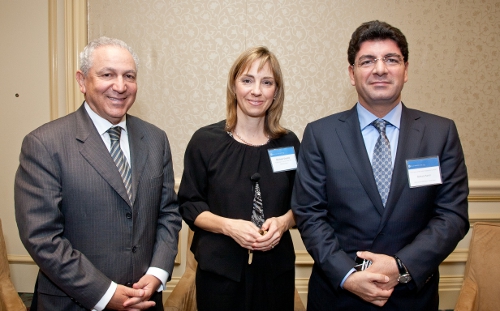Summary of the town hall “The Arab Awakening: How to Avoid the Transatlantic Community Missing the Boat” at the 2011 Annual Members’ Conference.
Participants
Bahaa Hariri,^ Member, Atlantic Council International Advisory Board
Aziz Mekouar,* Ambassador of Morocco to the United States
Moderated by Michele Dunne, Director, Atlantic Council Rafik Hariri Center for the Middle East
Michele Dunne, Director of the Rafik Hariri Center for the Middle East, moderated this off-the-record discussion exploring the political and economic dimensions of the Arab awakening and highlighting the need for a coordinated, transatlantic response to the popular uprisings that are rapidly transforming this strategically vital region.
Pointing to the need for economic assistance to support sustainable development and job creation in the Arab countries undergoing transition, participants noted that the transatlantic response to the Arab awakening has thus far lacked a coordinated and comprehensive strategy. The discussion also addressed the paralyzing effects of the European financial crisis, which has prevented potential donors from mobilizing adequate assistance to support the transitions. Policy recommendations raised during the session included trade incentives and debt relief to resuscitate regional economies that have been crippled in recent months by persistent street protests and labor strikes. At the same time, panelists emphasized the need for home-grown solutions to the economic challenges facing the Middle East and stressed that local governments – rather than the international community – must ultimately bear the burden of developing comprehensive economic strategies to support long-term growth and development.
As Egypt prepares to conduct parliamentary elections in November 2011, panelists highlighted the country’s regional significance as a cultural and economic leader, emphasizing that the outcome of its transition will define the success or failure of democratization movements across the Arab world. Participants also identified Turkey as a country that will exert considerable influence over the trajectory of the Arab awakening. In recent visits to Egypt, Tunisia and Libya, Turkish Prime Minister Recep Erdogan was welcomed by enthusiastic crowds which expressed support for Ankara’s newly assertive campaign for regional leadership of the Arab world.
Unlike neighboring monarchies and authoritarian regimes that failed to initiate political reforms quickly enough to preempt popular uprisings, Morocco’s government began taking steps in the 1990s to accommodate demands for democratization by implementing constitutional and political reforms. Panelists noted that Morocco successfully prevented the mobilization of mass protests observed in Egypt, Tunisia and other countries by beginning a process of top-down reform early enough to diffuse demands for regime change.
Upcoming elections in Egypt and Tunisia raise the question: To what extent will historically marginalized Islamist groups participate in the democratic process, and how much influence will they have over the next elected governments? Rather than exclude Islamist groups from the formal political arena – and risk radicalizing these elements – Morocco’s government made the strategic decision to allow the Islamist Justice and Development Party to compete for seats in parliament since 1996. Panelists argued that taking an inclusive approach to Islamist groups has had a moderating effect on their political agenda, but also noted that the vast majority of Muslims are moderate in their views and are unlikely to back highly conservative or extremist forces in upcoming elections.
Image: session_c.jpg
